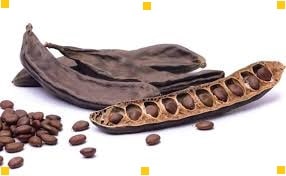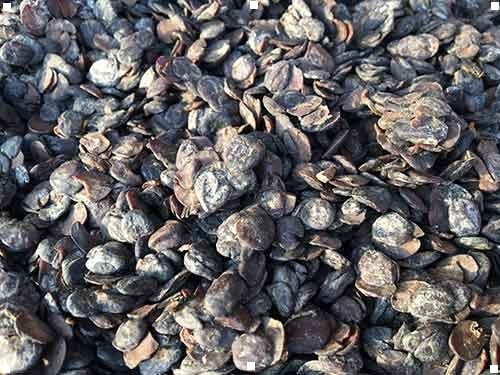Once upon a time, if a lady asks a question like “Is locust beans good for pregnancy?” she’ll most likely get the bad eye, or if she’s lucky get a detailed explanation of why she should always eat locust beans when she’s pregnant, especially in Africa. However, these days, the nutrition of our ancestors have taken a back seat while foods that have been rid of most of their nutrients and chemically processed are what the pregnant women crave.
Quick Facts About Locust Beans
Locust beans is a common part of dishes in Africa. In Nigeria, it is commonly used to prepare vegetables, giving them a unique sweetness and flavor no other sweetener in the world can give. It is a seed of a leguminous plant that is adapted to the tropical parts of Africa. The seeds are especially rich in protein and they are processed to rid them of the coat by cooking. Afterwards, they are fermented to make the popular spice.
During pregnancy, the mother and child needs more nutrients than the mother will normally need. To support the growth and development of the fetus, nutrients such as proteins, vitamins, and minerals are important to aid in development of organs and provision of energy to the mother, as well as the child. The tree of the plant is also very beneficial in the treatment of some health issues that may arise during pregnancy, such as high blood pressure.
In this article, we will help you discover the goodness a pregnant woman can derive from consuming locust beans during pregnancy. We will do this by highlighting the nutrients contained in the seeds and what part of pregnancy, mother or child, it improves.
Locust Beans: An Overview
The locust beans plant, Parkia biglobosa, is perennial tree that is known to be resistant to fire. It produces pods that are initially pink but turn brown on maturity. In these pods, you will find the economically important seeds. Usually, a pod contains about 30 seeds, but the number might be more than that. The seeds are contained in a pulp or mucilage inside the pod.

The most important part of the locust bean plant is the seed found in the pod. The seed is usually removed from the pod and cleaned of the pulp that surrounds it, to expose the seed coat. To get the seed, the seed – still covered by the seed coat – is cooked to soften and make the seed coat removable. Further processing of the locust bean seeds to make it consumable involve fermentation, making the nutrients it contains available to the body when eaten.
While the seeds are processed and used as seasonings to make vegetables and many other African dishes, the pulp – which is naturally sweet – can be processed to make sweet beverages. It can also be used, together with leaves and seeds of the locust bean plant, to feed livestock and poultry as they are good sources of carbohydrates.
In local medicine practice in Africa, the locust beans tree is important as it is used in the treatment of hypertension. It also has the ability to enhance the activity of dermal fibroblasts, making it effective in healing wounds. It is also used as an antimalarial and antibacterial in some parts of Africa.
Nutrition Info on Locust Beans
Every part of the locust bean tree is useful. However, the most useful part of the plant are the seeds. This does not mean other parts are not useful. Nutritionally, locust bean is an effective alternative to costlier sources of nutrients such as protein, as it is readily available in the rural areas. When it is being processed, the smell may be too offensive for some people to stand, one of the reasons it is not commonly used in the cities.
The fruit pulp of the locust bean is sweet, signaling the presence of sugars, primary producers of energy to the body. It contains about 67.30% of carbohydrates, 1.80% fats, and 11.75% fiber. The yellow color of the pulp depicts the presence of carotenoids. A 100 g of locust beans pulp contains about 49.175 µg of carotenoid, a precursor of vitamin A. it also contains vitamin C at 191.20 µg.
The fruit and seed of locust beans has a total phenol volume of 204.60 mg in 100 g of the fruit. It contains saponin, tannin, and phytic acid at 17.80 mg, 81.00 mg, and 60.00 mg per 100 g, respectively.
Why is Locust Beans Good for Pregnancy?
During pregnancy, many nutrients are important, some more than others, and a pregnant mother is expected to provide the baby she carries with all the nutrients it needs to grow and develop. Locust beans contain some nutrients that are considered important and will help the child grow better.
Here are some of the reasons you can consider locust beans good for pregnancy.
Prevents anemic condition
Although locust bean seed and pulp are not known to be abundant in minerals that help in making blood and red blood cells, they are abundant in vitamins that help in the absorption of iron – a mineral that is important in the formation of red blood cells.
Vitamin C is an important vitamin for the absorption of iron, and locust bean pulp happen to be abundant in this nutrient. It helps to improve the red blood cell count of the mother and the child.
Improves immunity
Vitamin C is an important nutrient that helps to boost immunity. It is considered an antioxidant due to its effectiveness in ridding the cells of oxidative waste and leaving them more energized than they would be with the waste in them.
It helps both the mother and child fight against infections better.
Excellent energy source
During pregnancy, it is common for mothers to complain of fatigue at different times of the day. However, with a carbohydrate that contains high amount of fiber as well, the mother can easily up her energy level by consuming the pulp, without adding much weight due to the presence of fiber.
Ensures better eye health
Carotenoid is a precursor for retinol, otherwise called Vitamin A. vitamin A is responsible for sharp sight. Consequently, the child is better positioned to have an excellent sight when born.
Supports strong bone and teeth development
Locust bean seeds are a good source of calcium, and when consumed by a pregnant mother, the child has a higher chance of developing with stronger bones and teeth – when the time is right.
Conclusion
Locust beans, like many indigenous plants, are filled with nutrients that are beneficial to whoever consumes them. It is abundant in vitamins such as A and C, giving both the pregnant mother and child the needed amount of these nutrients to help the child development and maintain the mother’s health.
Is locust beans good for pregnancy? The answer is yes. It is healthy, helps the mother avoid unnecessary weight gain during pregnancy while providing some important nutrients. However, it is important that a pregnant woman informs her doctor before consuming too much of locust beans as it contains phytochemicals that are considered dangerous at some levels in the human body.



